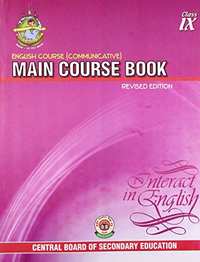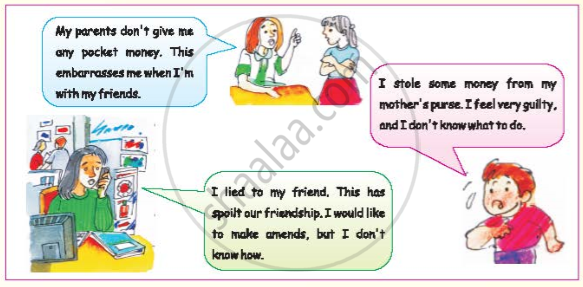Advertisements
Chapters
1.2: A Burglary Attempt
1.3: Can You Know People You Haven't Met
2.1: The Final Flight
2.2: The Sound of the Shell
2.3: Ordeal in the Ocean
3.1: The Indian Rhinoceros
3.2: Save Mother Earth
3.3: Save the Tiger
4.1: Radio Show
Chapter 4.2: Video Show
5.1: Bermuda Triangle
5.2: The Invisible Man
5.3: The Tragedy of Birlstone
5.4: Harry Potter
6.1: Tom Sawyer
6.2: Children of India
6.3: Children of Computer
▶ 6.4: Life Skills
6.5: We are the World
7.1: Grandmaster Koneru Humpy Queen of 64 Squares
7.2: It's Sports Day
7.3: Hockey and Foodball

Advertisements
Solutions for Chapter 6.4: Life Skills
Below listed, you can find solutions for Chapter 6.4 of CBSE CBSE for English Communicative - Main Course Book Interact in English Class 9.
CBSE solutions for English Communicative - Main Course Book Interact in English Class 9 6.4 Life Skills Exercise [Pages 126 - 131]
Read the following and share your feelings with the class.
INTROSPECT: Realise Your Potential.
Sixteen year old Shreya, a student of XI, angrily outbursts at her parents and says, "No one likes me".
She has not been able to develop an interest in any activity, be it painting, swimming, games or studying. She is not sure what types of relationships give her comfort.
She has never had a good friend. She is not clear about her choice of career.
Shreya is good-looking, as well as physically healthy. During the interview, she was preoccupied with what others think about her.
When asked to talk about her positive qualities, she thought for a long time but could not list any. Nor was she able to mention her negative aspects.
Self Awareness
Knowing your strengths and weaknesses will help you succeed.
Knowing our helps us in acknowledging our success as well as appreciating our capacity to do something with or without support from others.
This givee us a sense of well being and we are able to learn new skills and develop assets , thereby developing our confidence. Confident people attract friends and other stable relationships.
In due course , we are ready to accept various challenges with the right kind of Investment of energy towarde task completion.
Knowing our weaknesses helps us In accepting our limitations, and developing a willingness to take help when offered and enabling us to overcome our deficits.
This paves way to expansion of skills and qualities, which prove useful ln the long run. It is worthwhile to Introspect and reflect so as to realise our potential . This help to bring about a change in us and we are able to meet challenges .
lf Shreya had introspected or had been helped by her parents or teachers to reflect on herself, she would have understood her positive and negative qualities , her likes , dislike , strengths , weakness , feelings , emotions , outlooks , choices , values and attitude towards life.
self awareness paves the way to pregress with respect to relationships , academic success , professional and personal fulfillment .
Adapted from "The Quest",
The Hindu
Copy the worksheet in your notebooks and work in pairs to complete the worksheet to know all about yourself. This will enable you to discover your hidden strengths, work on your weaknesses, and develop your personality.
Johari Window Work Sheet
| A | B | C |
| How I describe myself? | How I describe my friend ? | How my friend describes me? (Fill this part from what the friend says about you) |
|
|
____________ ____________ _____________ ___________ _____________ ______________ ______________ ______________ |
Now transfer the points from the Johari Window activity work sheet to the table given below.
• Common points listed by student and his partner in Column A and C - to be put in 'Open Self
• The qualities pointed out by the other person (not the student himself) - to be put in 'Blind Self
• The qualities pointed out by the students (Column A) but unknown to other person - to be put in 'Hidden Self
• Qualities unknown to student and his partner but which might be known to teacher or some body else may be put in 'unknown self
| Open Self | Blind Self |
| Hidden Self | Unknown Self |
Several youngsters have problems in dealing with their parents. With your partner, discuss the difference ln views and complete the table below. Sometimes there may be no contradiction between the two views.
| Features | As we see ourselves | As our parents see us |
| How tidy we are | ||
| The types of clothes we wear | ||
| How courteous we are | ||
| How much we study | ||
| How independently are we allowed to express our opinions |
In pairs, choose one topic from the table in Question 3. Imagine that you and your parents are expressing your views on the topic. Use your notes from the table and write the dialogue that would take place. Make it funny! Share your dialogue with the rest of the class.
Ravi has a problem, so he asks his friends for advice. Read the conversation below and underline the expressions that are used for giving advice. (This could be done as role-play)
Ravi : My neighbours play very loud music, which disturbs me when I'm studying.
Mohan: Why don't you try persuading them to turn down the volume?
Shiela: If that doesn't work you could think of changing your study time.
Rahim: Why should Ravi have to do that? He really ought to report such antisocial behaviour to the police.
Shiela: Before taking drastic action like that, I would advise you to sort it out amicably with your neighbours.
Rahim: If l were you, I would play my music even louder!
Mohan: That won't solve his problem. Ravi, I think you should ask your father to take it up with your neighours.
In groups of four , use the language used in Question 5 to give advice in the following situations :

You are on the editorial board for the column ‘Your Problems’ in The Teenager magazine. You have received these two letters asking for your advice. (They appear to have come from the same family)
|
Dear Helpful Avanti My fifteen year old son is crazy about film music. He seems to be wasting all his pocla:t money on these meaningless CDs. He cannot even study without this noise. Though he is good at studies, I remain disturbed about this new obsession. There are all kinds of strange-looking posters on the walls of his study and he always wears those gaudy T-shirts and faded patched jeans. Also, he is very fond of Junk-food. I fear he is breaking all links with our culture. |
|
Dear Helpful Avanti I love film music and I have bought a lot of CDs from my pocket-money allowance. But whenever I switch on my CD-player, my father frowns and orders me to switch off the 'jarring noise'. He calls it 'cheap' and 'uncivilised' stuff. It is not that I do not like classical music, but when I am with my friends, we listen to film music. I like Indian clothes and food. But, I also like to wear western clothes and eat continental food occasionally. I do not like to disobey my parents, but I do not want to give up my music and other interests. |
In pairs, decide what advice to give to each of them. Then write one letter each, so that both father and son get a reply from The Teenager. Remember to use some of the language in Question 5.
Solutions for 6.4: Life Skills

CBSE solutions for English Communicative - Main Course Book Interact in English Class 9 chapter 6.4 - Life Skills
Shaalaa.com has the CBSE Mathematics English Communicative - Main Course Book Interact in English Class 9 CBSE solutions in a manner that help students grasp basic concepts better and faster. The detailed, step-by-step solutions will help you understand the concepts better and clarify any confusion. CBSE solutions for Mathematics English Communicative - Main Course Book Interact in English Class 9 CBSE 6.4 (Life Skills) include all questions with answers and detailed explanations. This will clear students' doubts about questions and improve their application skills while preparing for board exams.
Further, we at Shaalaa.com provide such solutions so students can prepare for written exams. CBSE textbook solutions can be a core help for self-study and provide excellent self-help guidance for students.
Concepts covered in English Communicative - Main Course Book Interact in English Class 9 chapter 6.4 Life Skills are Reading, Writing and Grammar, Literature Textbook and Extended Reading Text.
Using CBSE English Communicative - Main Course Book Interact in English Class 9 solutions Life Skills exercise by students is an easy way to prepare for the exams, as they involve solutions arranged chapter-wise and also page-wise. The questions involved in CBSE Solutions are essential questions that can be asked in the final exam. Maximum CBSE English Communicative - Main Course Book Interact in English Class 9 students prefer CBSE Textbook Solutions to score more in exams.
Get the free view of Chapter 6.4, Life Skills English Communicative - Main Course Book Interact in English Class 9 additional questions for Mathematics English Communicative - Main Course Book Interact in English Class 9 CBSE, and you can use Shaalaa.com to keep it handy for your exam preparation.
